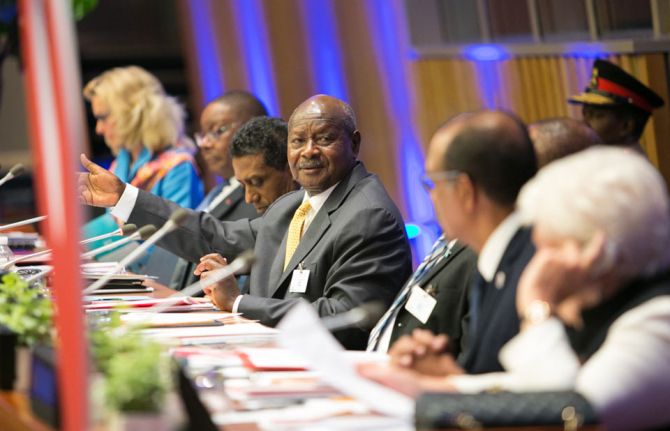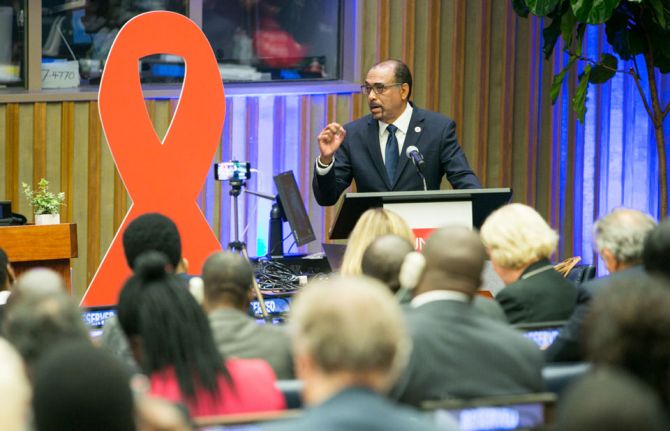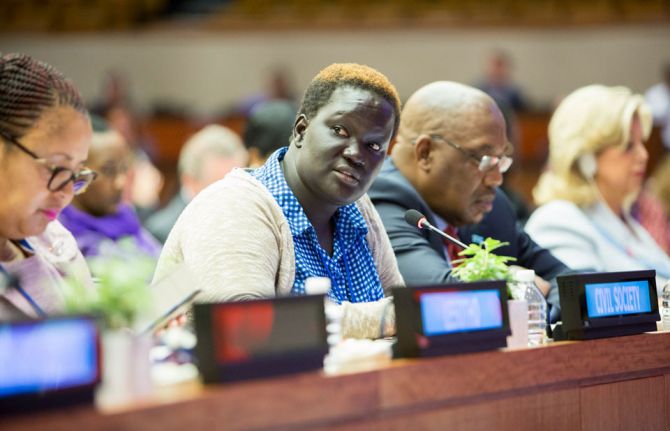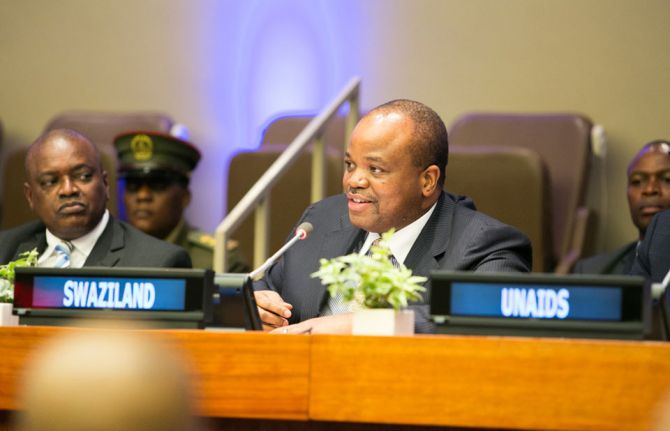





Press Release
UNAIDS calls to quicken the pace of action to end AIDS
21 September 2017 21 September 2017World leaders come together to renew the urgency around ending AIDS as part of the Sustainable Development Goals
GENEVA/NEW YORK, 21 September 2017—The President of Uganda, Yoweri Museveni, in collaboration with UNAIDS, brought together six heads of state or government to accelerate action and get countries on the Fast-Track to end AIDS. World leaders joined around 500 partners from government, the private sector and civil society on the sidelines of the United Nations General Assembly to reinvigorate political leadership around HIV.
The Fast-Track approach is saving more and more lives. In 2016, 19.5 million people—more than half the 36.7 million people living with HIV—were accessing life-saving treatment. The number of people who died from AIDS-related illnesses has been reduced by nearly half since 2005, and the global number of new HIV infections has been reduced by 11% since 2010.
However, the pace of action is still not enough to end the AIDS epidemic as a public health threat by 2030. In order to step up progress and achieve the global targets adopted in the 2016 United Nations Political Declaration on Ending AIDS, all partners need to fully implement their country Fast-Track strategy. Ending AIDS requires steadfast political leadership, commitment to action and accountability towards shared responsibility and reaffirmed global solidarity. Increased effective and efficient investments are, and will continue to be, an essential prerequisite for success. Elimination of stigma and discrimination and full recognition of human rights are cornerstones of sustainable progress.
“Leadership, partnership and innovation will transform the epidemic,” said UNAIDS Executive Director Michel Sidibé.
President Museveni was the first head of state in Africa to launch a presidential Fast-Track initiative on ending AIDS as a public health threat, known as “Kisanja Hakuna Mchezo”, or “no time for playing games”.
“I am confident that working together with you all, we shall attain an AIDS-free Africa. It is possible to end AIDS in our generation!” said President Museveni.
During the event, the speakers outlined the positive impact that the Fast-Track approach to ending AIDS is having on people, health systems and the broader Sustainable Development Goals in Africa and beyond. They noted that addressing HIV within the Sustainable Development Goals will pave the foundation of the AIDS response.
“We must build on the Fast-Track commitments. We cannot stop before we have reached the finish line,” said Jacquelyne Alesi, a civil society representative from Uganda.
Speakers made a strong call for political leadership, global solidarity and shared responsibility to build momentum and deliver on the goal of ending AIDS by 2030, highlighting the role that supporting strengthened health systems plays, not just in making progress towards the Fast-Track Targets, but also in addressing stigma and discrimination.
“I am not speaking of a vague hope, but of a willingness of the heart. I do not say “we could defeat AIDS,” but rather “we will end AIDS,” said Line Renaud, singer and AIDS activist.
Momentum is building, but has not yet reached a critical mass. When the United Nations General Assembly adopted the Political Declaration on Ending AIDS in June 2016, Member States committed to achieve global and regional Fast-Track Targets by 2020.
Quotes from speakers
“I call for a global solidarity so that the initiative of 2 million community workers in Africa becomes a reality and strengthens our health systems for the benefit of the people.” Alpha Condé, President of Guinea
“We are still facing challenges in addressing the control of new infection rates, particularly among adolescent girls and young women. We must give priority attention to HIV prevention by providing bold political leadership and mobilizing adequate resources for HIV prevention.” King Mswati III, Swaziland
“Now is the time to act. It’s no time for complacency.” Danny Faure, President of Seychelles
“I am delighted to say Botswana has made significant strides towards 90–90–90 because of its robust approach to ensuring access to treatment for all and because of its strong and unflinching leadership and political commitment towards ending AIDS.” Mokgweetsi Masisi, Vice-President of Botswana
“Either we unite in fighting to end AIDS or we lose the cause. With a solid unity of purpose, determination of political will and commitment of resources, we can end AIDS.” Arthur Peter Mutharika, President of Malawi
“Zambia’s commitment to tackling the AIDS epidemic has been durable and consistent.” Edgar Chagwa Lungu, President of Zambia
“I want us to change the African proverb. I want us to go faster and further together so that we can make the impossible possible.” Deborah Birx, United States Global AIDS Coordinator and Special Representative for Global Health Diplomacy
“We should have no tolerance for discrimination. We can do this together, leaving no one behind.” Lorena Castillo de Varela, First Lady of Panama and UNAIDS Special Ambassador for AIDS in Latin America
“The young people are telling us that parents are not listening. The most important partnership is that of the mother and father, because when that partnership fails to protect our children, particularly our young girls, from harm, our society fails.” Monica Geingos, First Lady of Namibia and UNAIDS Special Advocate for Young Women and Adolescent Girls
“I encourage decision-makers, government and all of our partners to unite more than ever, because it is together that we will defeat this epidemic.” Dominique Ouattara, First Lady of Côte d’Ivoire and UNAIDS Special Ambassador for the Elimination of Mother-to-Child Transmission
“I reaffirm Nigeria’s commitment to achieving the Fast-Track Targets towards ending AIDS by 2030.” Sani Ali-yu, Director, National Agency for the Control of AIDS, Nigeria
“We pledge our long-term support to this noble cause and Fast-Tracking towards the end of AIDS.” Eric Wang, Secretary General, China–Africa Business Council
|
In 2016, UNAIDS estimated: 19.5 million people were accessing antiretroviral therapy 36.7 million [30.8 million–42.9 million] people globally were living with HIV 1.8 million [1.6 million–2.1 million] people became newly infected with HIV 1.0 million [830 000–1.2 million] people died from AIDS-related illnesses |
View event highlights:
UNAIDS
The Joint United Nations Programme on HIV/AIDS (UNAIDS) leads and inspires the world to achieve its shared vision of zero new HIV infections, zero discrimination and zero AIDS-related deaths. UNAIDS unites the efforts of 11 UN organizations—UNHCR, UNICEF, WFP, UNDP, UNFPA, UNODC, UN Women, ILO, UNESCO, WHO and the World Bank—and works closely with global and national partners towards ending the AIDS epidemic by 2030 as part of the Sustainable Development Goals. Learn more at unaids.org and connect with us on Facebook, Twitter, Instagram and YouTube.
Resources
Press centre
Download the printable version (PDF)
